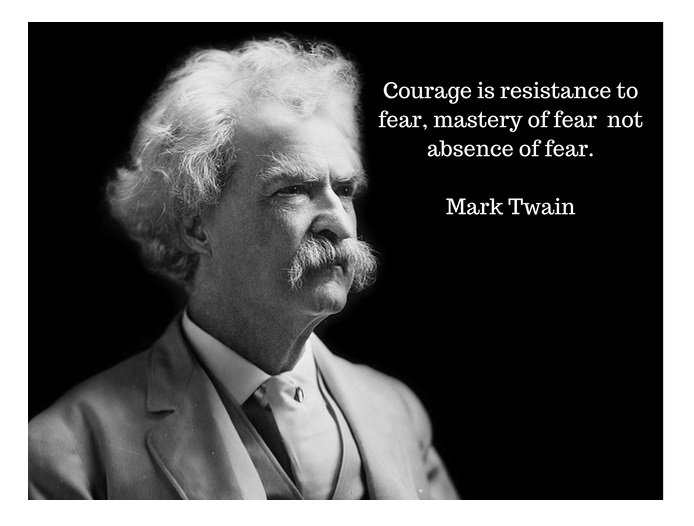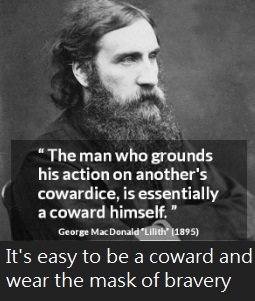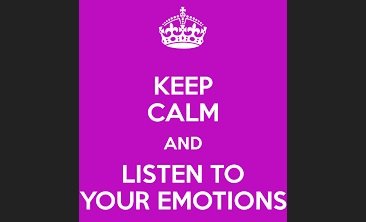As the culture leans into cancel culture , victim hood, and 'feels over logic', courage is a trait that's becoming rarer and rarer.
How often do you disappointed yourself by succumbing to fear?
Cowardly actions can, if left unchecked, become a learned trait, a default setting... but with focused introspection, the future need not mirror our past cowardly actions.
This learned skill of courage, all starts from the way we relate to our emotions.
Which starts with how we relate to ourselves.
Know yourself.
This means that we have stop looking at distressing emotions as barriers to action.
This means learning to proceed with life even in the presence of fear, anxiety, guilt or shame.
These maladaptive emotional responses (formed in the formative years) control your actions if left unchecked.
Guilt and shame is like cancer of the psyche.
It will eat away at you if not addressed.
It's long been known that the body and mind are not separate, but intimately connected, in ways that we still don't fully understand. (the legalized drug dealer industry, called big pharma, try to tell you differently).
More and more studies are emerging that confirm what we've thought for centuries - that the mind and body are more of one in nature, than separate.
While this is good in helping to understand the relationship, - and therefore healing -of the mind/body - it's very bad for the profits of drug corporations who are motivated by profit, and not the Hippocratic oath (do no harm).
What does this have to with cowardice?....
It's all connected.
To understand the coward, we first need to understand the huge role that emotions play.
In context of this post, there are two kinds...
Adaptive and Maladaptive
Understanding these types of emotions will people identify distressing emotions that promote cowardice - and thus, help to identify the things that will promote courage.
Emotions:
Emotions are the first line of processing the world around you.
They serve a critical role in directing our attention,quickly, and without the need for thought. (thought always come after the emotional input).
For those who do not have an intimate knowledge, and positive relationship with of our emotions, they can be seen as a disruption in our our ability to think rationally.
For those who do not have an intimate knowledge, and positive relationship with of our emotions, they're perceived as something that impedes us.
As you can see, to not have a positive relationship with your emotions, places the perspective of 'mind' and 'emotion' into two separate - and conflicting - constructs.
And that's precisely how the whole body doesn't work, if it's working properly and in sync with itself.
Our emotions, when functioning properly, help us , not fight us - in adapting to our environment.
They provide information and they can direct our attention at a speed that often surpasses that of our cognitive mind.
All emotions provide us with information.
The most distressing (negative) emotions are often full of the most important information.
Fear is one of those emotions.
Anxiety is another , and this can alert us to the fact that we might be taking a wrong path in our live's.
Guilt and shame can signal to us that our behavior is not in line with our moral compass.
(even without a conscious idea of what your moral compass really is).
Our emotions are crucial - and are an integral part of who we are.
The problems arise with our emotional selves with our inability to deal with the MALADAPTIVE emotions.
Instead of signaling adaptive ways to interact with our environment, they deceive us and can actually become the seeds of narratives that will diminish our well-being.
These maladaptive emotions no longer help, but instead, hinder.
These maladaptive emotional responses involve learned responses on the basis of previous (often traumatic) experiences.
Maladaptive emotions are the undressed experiences echoing down through life. And if not addressed - can last a lifetime.
They are the suppressed emotions.
This avoidance can give rise to a multitude of problems phobias, anxiety disorders, anger problems, depression, OCD , and overly distorted levels of guilt and shame.
People try to cope with these distressing emotions in one of two ways - through consciously REASONING or through conscious or unconscious, SUPPRESSION.
But both of these methods, are actually antithetical - opposition to - to the cultivation of courage.
Why?
because they're treated as distressing emotions that need be overcome. To be beaten in some way.
The framing of the emotions becomes an 'us' and 'them' scenario, which is also in opposition to the way the mind-body works.
Both strategies (conscious or otherwise) tend to fail in achieving their intended purpose - one of freeing us up from the maladaptive emotions.
Reasoning.
Reasoning with our emotions is often attempted when we're aware of the fact that our maladaptive emotions are not in line with the reality of our environment.
And that creates a problem...
It can seem a reasonable tactic to try and argue with our emotions, so our mind can exert the control.
Emotions are rarely controllable by sheer acts of will or to the power of conscious thought .
Emotions speak a different language than that of the mind.
As most of us know - an intense emotion is more likely to override our ability to think clearly at all.
It is the emotion that has the loudest - and deciding - voice, not your mind.
Our thoughts alone (will power) will rarely free us from anxiety disorders, of phobia's, or the many other forms of maladaptive emotions.
Suppression.
If we cannot defeat these emotional states with our thoughts, our willpower alone - then what other options can be used?
How do we force them out of our conscious awareness ?
Suppression.
This method can work at times, but there is a very high price to pay for it.
Suppressing an emotion doesn't make it go away.
It only pushes it deeper into the unconscious and thus,internalize it.
Internalizing our emotional states merely displaces their effects, it doesn't make them disappear.
So, as a couple of examples , instead of feeling openly angry we may develop chronic muscular tension or migraine headaches.
Instead of feeling anxiety, we may develop bodily symptoms such as digestion issues or an inability to sleep.
Suppression creates (another) barrier to courageous action.
While you may no longer feel an emotion due to suppressing it, the expression of it via some psychosomatic ailment we created in the process of the suppression, will become our excuse for remaining stagnant.
Procrastination through self inflicted physical illness.
If reasoning with maladaptive emotions proves ineffective, and the suppression only distorts the problem, what are the other options?
One tool that seems to help to a large degree, is called emotional labeling.
Emotional labeling entails noticing the presence of an emotion.
Simple (the best answers to complex problems generally are).
Instead of arguing against it or trying to suppress it, accept it.
Label it , not argue with it, or ignore it.
Examples:
"I'm feeling anxious",
"I am experiencing fear"
"I am feeling angry".
This may seem a simplistic act, but growing body of research (greenburg) has revealed that just by the act of consciously labeling an emotion (feelings into words) it helps to regulate it in a 'downwards' trajectory.
You become it's master, by not trying to master it all !
By calling it by it's name, it actually serves to reduces it's influence...
The vocalization itself shows that there's decreased activity in the amygdala (the 'emotional responses' part of the brain).
After labeling our emotion, we can then be in a better position to evaluate it.
We can work out - if anything - the emotion is signaling us to do.
An adaptive emotion is pointing in a clear direction , with little reason to 'disobey' what it's trying to tell us.
For maladaptive emotions, however - it's can be best by NOT doing what the emotion seems to be saying (which is usually some form of avoidance).
Learning the skill of being able to vocalize a maladaptive emotion is a great opportunity for those afflicted by the said maladaptive emotions.
THIS is where 'the cultivation of courage' begins....
Courage is the ability to take an action - even when doubt is present.
The more our life is afflicted by maladaptive emotions, the more opportunities we have to practice acting in this manner.

With the act of getting to know yourself - not fighting with yourself - it then becomes possible to turn our maladaptive emotions from inhibitors , to the promoters - of a stronger self.
When a distressing emotion is triggered, we need to label it, accept it, and then move forwards - regardless of how uncomfortable we feel.
'Practice makes perfect', as they say.
Over time, and with consistent application of this strategy - you'll likely notice that maladaptive emotions emerge with a diminished frequency.
Even if they continue to be part of your life, it shows that
distressing emotions need not be that walls of a prison that we've constructed for ourselves .
Dealing with them and not hiding from them (or trying to exert control over them), IS the art of acting with courage.





HIVE!D
Its a great article bruv. Had to show @exodesigns and @newparadigmtt this followup. HIVE!Regards
Cheers matey - part 2 gets brutal ! lol
Legit ,
Upvoted!
Manually curated for #informationwar (by @truthforce)
Delegate to the @informationwar! project and get rewarded